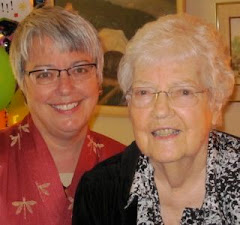I was prompted by hearing an NPR radio program about the very low rate of a successful outcome if someone is defibrillated. (I wish I could find the NPR article to share...). TV shows use defibrillators with great frequency, and the person virtually stands up and walks away at times. In fact, as I recall the rate at which people actually leave the hospital and return to their previous level of health is something like 4%.
Wow. And even less likely of success on an 89-year-old patient with heart disease and diabetes.
I sat down with my mother and talked about the study, and asked her what she wanted. She said she didn't want any 'heroic measures' - she repeated that phrase. She said she was ready to die.
But what does that mean? And how do we ... make it happen? or rather, make sure that certain unwanted things do not happen?
We went to her physician. He listened, and asked some great questions. What about all the pills she's taking - does she want to stop taking the medicines to help her diabetes, blood pressure, atrial fibrillation, and on and on? No, she said she is not ready to throw away her pills to hasten her death. On the other end of that spectrum, does she want every and all measures to forestall death? Nope.
So, in between those extremes are many other questions. What if she is having chest pain. Although she doesn't want 'heroic measures', what about pain medicines? After a number of clarifying questions, we are now clear that she would like to have 'comfort measures' but no measures purely to extend life.
So she filled out and signed the Living Will documents (provided by our local hospital) and I distributed it to all her pertinent doctors and put copies in her purse, my purse, and gave to her assisted living center. But in addition, I recorded her talking about her wishes in my cell phone camera. If needed, I will play it for her doctors if anyone needs help understanding.
And of course, she has every right to change her mind right up until the end.
Now every time we consider a new health challenge - congestive heart failure all the way to new glasses. I need to ask myself and her - is this consistent with decisions she has made? We talk about it each time. Do we choose to go to the doctor for this or that new symptom? Is this comfort-enhancing vs life-extending?
By the way, I found a great piece on the subject when looking for the NPR story that started this journey, called What To Do The Next Time Dad's Heart Stops, by Richard Knox, at http://www.npr.org/templates/story/story.php?storyId=105593750. Still can't find that other piece but I'll keep looking.
So, I will sit with her when death comes. Hold her hand. Let her feel not so alone. Make sure she has the death she wants.




No comments:
Post a Comment